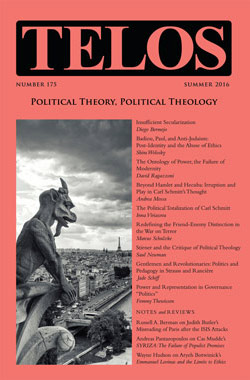 Critical theory inherited the mission of philosophy to know the world and to pursue the good life. Careful examination should shed light on the cosmos and our place within it and contribute to a beneficial ordering of human concerns, when wisdom informs governance. Yet that aspiration to know the world encountered the limits of intelligibility, beyond which reason could not proceed. Meanwhile, the efforts to remake the world in the spirit of reason elicited processes of rationalization, as deleterious to the world around us, the natural environment, as to the world within us, the ongoing cultural crisis of modernity and its social corollaries. That is Horkheimer and Adorno’s dialectic of enlightenment at the foundation of the critical theoretical tradition that continues to provide a framework with which to articulate a critique of the contemporary in its many heterogeneous facets: the disruption of all forms of solidarity, the pressures on family structures, the erosion of educational opportunities, the growing gap between rich and poor. Add to this the ominous shifts in the international order, including the breakdown of state structures from North Africa through the Middle East, the strains on the European Union, and the return of a repressive semi-dictatorship in Russia, while—at this point in the presidential election season—the United States seems to be tumbling dangerously toward Weimar conditions.
Critical theory inherited the mission of philosophy to know the world and to pursue the good life. Careful examination should shed light on the cosmos and our place within it and contribute to a beneficial ordering of human concerns, when wisdom informs governance. Yet that aspiration to know the world encountered the limits of intelligibility, beyond which reason could not proceed. Meanwhile, the efforts to remake the world in the spirit of reason elicited processes of rationalization, as deleterious to the world around us, the natural environment, as to the world within us, the ongoing cultural crisis of modernity and its social corollaries. That is Horkheimer and Adorno’s dialectic of enlightenment at the foundation of the critical theoretical tradition that continues to provide a framework with which to articulate a critique of the contemporary in its many heterogeneous facets: the disruption of all forms of solidarity, the pressures on family structures, the erosion of educational opportunities, the growing gap between rich and poor. Add to this the ominous shifts in the international order, including the breakdown of state structures from North Africa through the Middle East, the strains on the European Union, and the return of a repressive semi-dictatorship in Russia, while—at this point in the presidential election season—the United States seems to be tumbling dangerously toward Weimar conditions.
|
Traveling in Paris, Judith Butler published a “letter” dated November 14, in English on the Verso blog and in French in Libération, the day after the ISIS attacks, entitled “Mourning becomes the Law.” The short text treats two phenomena and argues for a connection between them: the process of mourning the victims of the attacks and the expansion of counter-terrorist practices by the state. Butler’s thesis is that the shared grieving of the dead served exclusively as a vehicle to justify amplified police powers: in this sense, mourning becomes the law, or at least law enforcement. A close look at her claims, however, shows significant deficiencies in the account of mourning and an important misreading of the Parisian response. The reader may recall observations made in 2013 by Professor Bruno Chaouat of the University of Minnesota-Twin Cities regarding the strange quotation, or misquotation, of Emmanuel Levinas by Judith Butler. In one of her recent books, Parting Ways: Jewishness and the Critique of Zionism, Butler quotes Levinas as having said that Palestinians are “faceless.” Such a statement was obviously pure invention on her part and in no way figures in the text she claims it comes from: “Israël, éthique et politique.” Many of her epigones jumped to her defense, hardly allowing a serious debate on methods and ethics of scholarship. |
||||
|
Telos Press Publishing · PO Box 811 · Candor, NY 13743 · Phone: 212-228-6479 Privacy Policy · Data Protection Copyright © 2024 Telos Press Publishing · All Rights Reserved |
||||







